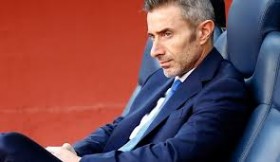Arsenal’s summer transfer window saw them sign Martin Zubimendi and Christian Norgaard to bolster their midfield. However, sporting director Andrea Berta initially had different defensive midfielder targets in mind. While Zubimendi was a long-term target, Berta played a key role in bringing in Norgaard for his experience following Thomas Partey’s exit. Zubimendi has impressed early on, while Norgaard’s debut is delayed due to injury, highlighting Arsenal’s strategic approach to midfield recruitment.
Arsenal's summer transfer window saw significant activity in bolstering their midfield, with the high-profile acquisitions of Martin Zubimendi from Real Sociedad and Christian Norgaard from Brentford. However, behind the scenes, sporting director Andrea Berta reportedly had his sights set on a different defensive midfielder altogether, according to insights from The Athletic.
The Gunners' pursuit of midfield reinforcements was no secret, and the eventual capture of Zubimendi and Norgaard was seen as a strategic move to strengthen the team's spine. Zubimendi, in particular, had been on Arsenal's radar for quite some time, with reports suggesting that the player had agreed to terms as early as January. By the time Berta was appointed as sporting director, the club was already deep in negotiations to secure the Spaniard's services.
Despite the advanced stages of the Zubimendi deal, Berta apparently had alternative defensive midfielders in mind. While the report doesn't explicitly name the players Berta preferred, it highlights a difference in opinion regarding the ideal profile for the defensive midfield role. It seems Arsenal had already identified Zubimendi as their primary target before Berta's arrival, and the club remained committed to that decision.
Ultimately, Berta aligned with the club's decision to sign Zubimendi, but he played a more prominent role in the acquisition of Christian Norgaard. The Danish midfielder was brought in to add experience and stability to the midfield following Thomas Partey's departure. Berta reportedly favored Norgaard over Sevilla's Lucien Agoume, viewing the former as a more proven and reliable option. Agoume, while possessing considerable potential, was considered a less established player compared to Norgaard.
The decision to prioritize experience in midfield reflects a strategic approach to complement the existing squad. With Partey's exit leaving a void in the defensive midfield area, Arsenal sought a player who could immediately step in and provide a solid foundation. Norgaard's Premier League experience with Brentford made him an attractive option, as he was already accustomed to the physicality and intensity of the league.
Zubimendi's arrival has generated considerable excitement among Arsenal fans, and the player has already made a positive impression in his early appearances. However, Norgaard has yet to make his debut for the club due to a minor injury. Once fully fit, Norgaard is expected to play a crucial role in Arsenal's midfield, providing a physical presence and defensive cover.
The contrasting profiles of Zubimendi and Norgaard highlight Arsenal's balanced approach to recruitment. Zubimendi brings technical quality and tactical awareness, while Norgaard offers experience and defensive solidity. Together, they form a complementary partnership that could significantly enhance Arsenal's midfield options.
The revelation that Berta initially had different targets in mind provides an interesting insight into the decision-making processes within a football club. While the sporting director plays a key role in identifying and pursuing potential signings, the final decision often involves input from various stakeholders, including the manager, scouting department, and club executives.
In this case, Arsenal's pre-existing interest in Zubimendi ultimately influenced the club's transfer strategy. While Berta may have had his own preferences, he ultimately supported the club's decision and played a significant role in bringing in Norgaard, a player who aligned with the club's overall objectives.
As Arsenal continue their campaign, the performances of Zubimendi and Norgaard will be closely scrutinized. The success of these signings will depend on their ability to integrate into the team, contribute to the overall performance, and justify the decisions made by the club's hierarchy.
